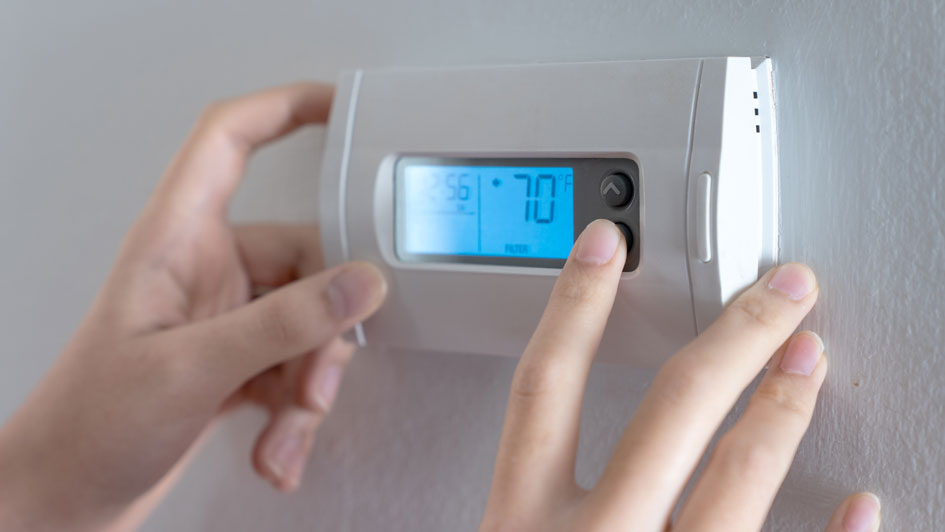
It's always nice when we manage to save money on our utility bills, but it just so happens there’s a way to do it when you aren’t even home.
The secret is your thermostat. By using automatic schedules, you can tailor the temperature to your needs. This means establishing various temperature settings for when you’re at home, away or even when you’re asleep.
If you're willing to make these adjustments, you can enjoy comfy temperatures while cutting down your energy bills. Take a look at a few ways your thermostat can save you money in the summer:
While at Home
When you’re home, you want a nice range of pleasant temperatures. It's only natural to want your thermostat lower in the summer while inside to make the most of the cool air.
But the most energy-efficient temperatures for when you're in your home during the summer is actually around 78 and 80 degrees Fahrenheit. With this adjustment, you'll keep cool while still keeping your energy bills low.
While Away
If you're setting the temperature for whenever you're gone, it’s advantageous to set the thermostat higher for while they're gone.
For some homes, you can set the thermostat to temperatures as high as 88 degrees while no one is home before lowering it back to the sweet spot of 78-80 degrees when you or a family member return. This way, your air conditioning system isn't working around the clock to provide cooling for a bunch of empty rooms.
While Sleeping
To enjoy a good night's sleep during the summer, you want a nice cool temperature. A great place to start is between 68-72 degrees Fahrenheit. This will keep you from getting too hot or too cold while you're trying to sleep.
Other Ways to Use Less Energy:
- Put in a smart thermostat: Trying a smart thermostat in the summer can lower energy costs by automatically adjusting to your lifestyle and home environment. A smart thermostat manages the temperature if you are home or sleeping, while allowing it to get warmer when the house is empty. With models like the Lennox iComfort, you have the ability to remotely access and change the temperature through your smartphone, tablet or laptop. Scheduling smart thermostat installation in your Chelan and Wenatchee home is an effortless way to set the correct temperature even when you aren’t home.
- Replace current equipment with a newer HVAC system: A high-efficiency HVAC system can save money in the long run. If a system boasts high energy efficiency, you can also count on lower utility bills since more efficient equipment requires less energy to reach your preferred temperatures. Air conditioning installation in Chelan and Wenatchee is only a phone call away, so don't hesitate to reach out to local pros like Lakeside Heating & Air who can set you up for success.
- Stay on top of routine AC maintenance: Hiring a skilled professional to perform regular air conditioning maintenance in Chelan and Wenatchee can have a significant impact on your utility bills. With regular cleaning of the coils, checking for damage and clearing ventilation of dust and debris, this can help your HVAC system run more efficiently. More efficient operation reduces strain on important or delicate components and lowers operational costs, resulting in lower energy usage and subsequently, smaller bills.
- Clean or replace the air filter on a regular basis: A regular schedule for cleaning or replacing the HVAC system's air filter saves money by improving airflow. When filters are clogged with dirt and debris, air conditioners have to work harder, and this greater strain could shorten the system’s life span and cause breakdowns.
- Verify your attic has enough insulation: Insulation is one of the key components in any energy-efficient home, keeping the hot air outside and the cool air inside through summer. The North American Insulation Manufacturers Association (NAIMA) recommends that homes in the southern United States should install at least 13-14 inches of insulation, while states further north need 16-18 inches.
- Check your ventilation: A leak in the air ducts could increase your energy bills much more than 20 percent, plus it can affect equipment such as your water heater, clothes dryer and other appliances to get into the atmosphere of your home. Watching for signs of leaks and sealing them can address both concerns.
- Seal all other leaky spots in your home: Sealing up other leaks in your home with caulk, foam sealant or weather-stripping can help keep it cooler on hot summer days. Don't forget to check for any gaps around windows, doors and even outdoor fixtures. Making time to seal leaks now can help you save a lot in the long term.



